- Home
- Views On News
- May 3, 2022 - 5 Indian Companies with the Highest Share Price. Are they Likely to Split?
5 Indian Companies with the Highest Share Price. Are they Likely to Split?

Stock splits are back in the news.
Multibagger stock Saregama India decided to go ex-stock split by changing its face value from the previous Rs 10 to the new face value of Rs 1 on 6 April 2022. The change went into effect on 27 April 2022.
As the announcement was made, the share price of Saregama surged 3% to Rs 5,088 on the Bombay Stock Exchange (BSE) in the deals done during the very same afternoon.
Does this change the market cap of the company?
Let's understand the concept with an example.
Imagine a medium sized pizza with 6 slices. You have more guests than you anticipated and decide to split the pizza from 6 pieces to 12. The price of the pizza remains the same, but you can cater to more guests with the same pizza.
Therefore, the pizza retains its worth no matter how many extra pieces you decide to slice from it.
This is essentially what a stock split is in a nutshell.
Does a Stock Split Impact Current Shareholders?
This split in the stock does not really impact the overall market capitalisation of the company. This means that the value of the current shareholders is not diluted in any way.
What the stock split actually does is change the price of the share.
This happens as the number of outstanding shares increases and the price of the stock decreases proportionately. This makes the shares more liquid and affordable.
For existing shareholders, this translates into holding a higher number of shares but at a lower price point.
On the other hand, it also motivates prospective investors who previously would not have bought a highly priced share like Saregama India to consider a serious purchase.
Other than gaining new investors, how else does the company gain from a stock split?
Experts suggest that stock splits are good to bump up demand. With more people interested to purchase the stock, the share price can shoot up. This means the company can experience a total value increase.
It may be temporary, but a likely swing, nonetheless.
Mind you, the company does expose itself to volatility as individuals may load up on the stock once it gets cheaper.
It's for this reason that Warren Buffett's Berkshire Hathaway has never opted for a split.
Buffett has said if Berkshire were to split the stock and lower its price, they would get a shareholder base that would not have the level of sophistication and the synchronisation of objectives that they have now.
Berkshire Hathaway, as of Friday, traded at US$ 484,340 per share.
So, with Saregama, a highly priced share leading the way in stock splits in 2022, are other players in the same higher priced share category likely to follow?
Here's a list of the 5 Indian companies with the highest share price. Let's see if a stock split is on their cards in the foreseeable future.
#1 MRF
Madras Rubber Factory (MRF) is a leading tyre manufacturer in India. Its shares currently trade at Rs 73,180 apiece as of 29 April 2022.
The company started out in the backyard shed of K.M. Mammen Mappillai in erstwhile Madras as a small toy manufacturing unit. Today, it is the most highly priced stock in India.
As of April 2022, the company has a total of 4.2 m outstanding shares. MRF has gone through two rounds of stock splits way back in 1970 and 1975 in the 1:2 and 3:10 ratio respectively. Since then, no share splits have taken place to date.
The share price has experienced a few highs and lows. It plummeted to Rs 10,000 per share in November 2012 and recorded its highest share price of Rs 98,575 in February 2021. The average share price hovers around Rs 80,000.
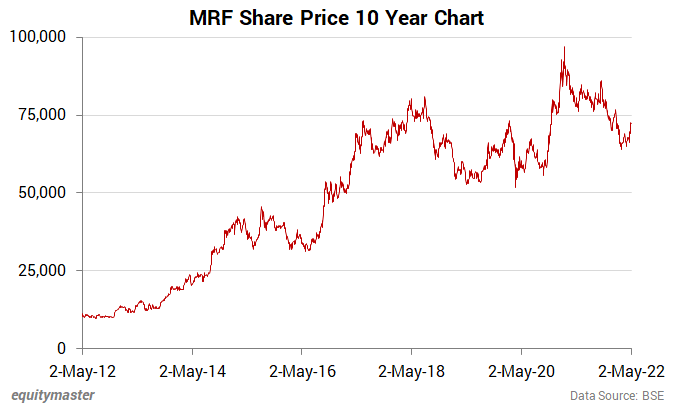
Generally, with such a high price per share, retail investors will not find MRF a viable investment opportunity.
So, the question is, will this drive the company towards a dilution and invite more investors to put their money in the stock.
Perhaps not.
Even when the stock price fell to Rs 10,000, it was still an expensive investment proposition for the majority of retail investors.
Moreover, the company has strong fundamentals, a profit after tax (PAT) of Rs 12.5 bn and is almost debt free as per the annual reports released for the financial year 2021.
The company is not easily affected by market volatility which becomes a possibility if its share price is diluted and there are bulk transactions in the market.
Given that the company is in a position of financial strength, a stock split does not seem an expected route that MRF is going to take in the next few years.
To know more, check out MRF's financial fact sheet and its latest quarterly results.
#2 Page Industries
Page Industries is a name that dominates the garment industry in India.
It is the only licensed company listed on the Indian stock exchange with the license to manufacture, distribute and market the world renowned JOCKEY® products in South Asian Association for Regional Cooperation (SAARC) countries except for Bhutan and Pakistan.
It also exports the products to the United Arab Emirates (UAE), Oman, and Qatar.
Recently, Jockey renewed its license with Page Industries until 2040.
In addition to 'Jockeying' around, the company has an exclusive license to manufacture, market, and distribute Speedo Internationals' products in India.
Page Industries turned out to be a multibagger stock when it hit the Rs 36,000 per share price mark in 2018 recording 10,000% returns to its shareholders since its initial IPO issue price of Rs 360.
Since 2018, the company share price has increased by another 2,840%.
As of April 2022, Page Industries has a total of 11.2 m outstanding shares. The stock is currently trading at Rs 46,248 as of 29 April 2022 and is nearly touching its 52 week high of Rs 46,738.
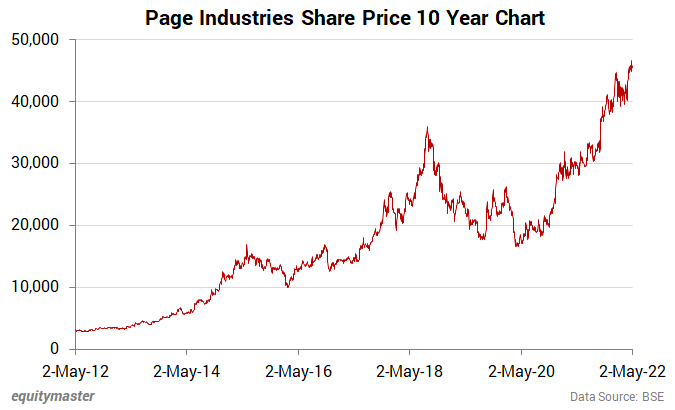
With Jockey taking away the condition of the 50% stake for promoters in the company, the promoter holding has since fallen to 47.2%.
Page Industries has always been the frontrunner in its segment. It has a track record of consistent financial performance over the years. This is evident from the 25.4% CAGR in the last 5 years.
Since its listing in March 2007 and subsequent phenomenal rise in its share price, the company never split its stock.
Given its stable performance, high dividend payout, and exclusive licences, it's unlikely that Page Industries will consider a stock split anytime soon.
To know more, check out Page Industries' company fact sheet and quarterly results here.
#3 Honeywell Automation India
The erstwhile Tata Honeywell started out as a joint venture between the Tatas and Honeywell Group, USA 1987. The JV ended in 2004.
Rechristened as Honeywell Automation India, the company is now a wholly owned subsidiary of Honeywell USA and is a leading provider of integrated automation and software solutions in the country.
The company boasts of a wide product portfolio in environmental & combustion controls, sensing & control, etc. It's a market leader in electronic instrumentation and process control equipment industries.
Honeywell Automation currently has 8.8 m outstanding shares as of April 2022 of which 75% are held by the company's promoters.
At the initial IPO issue in March 1993, the share price of the company was Rs 25. It's an example of a penny stock that went on to become a multibagger. The share price as of 29 April 2022 stands at Rs 40,999, touching a high of Rs 49,805 on 15 March 2021.
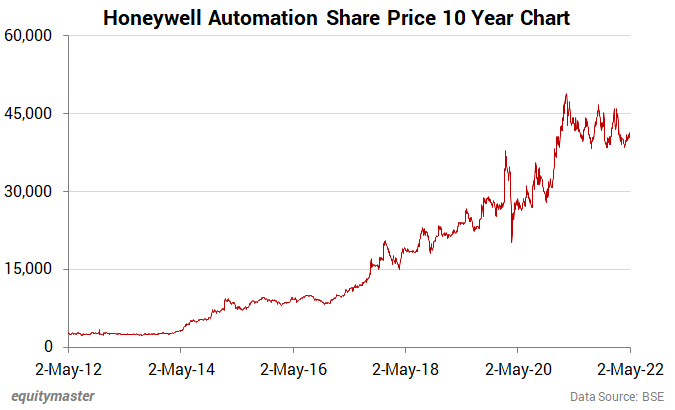
In the last 5 years, Honeywell Automation has delivered a 400%+ return to its shareholders. Moreover, the company's shares are a favourite among mutual funds. They have held on to 10%+ of total equity over the past few years.
As per the annual report for 2020 - 2021, the company recorded an overall PAT of Rs 4.6 bn delivering a return of 15.1% on sales over the previous year's 14.9%. The company has maintained a healthy Return on Capital Employed (ROCE) of 32.4% and profit growth of 22.6% over the past 3 years.
With an experienced management team at its helm and by a strong balance sheet, Honeywell Automation has not opted for a stock split in its 37 year history.
Going forward, it is not something that is likely to happen in the near future.
To know more, check out the Honeywell Automation company fact sheet and its latest quarterly results.
#4 Shree Cement
Listed on both the National Stock Exchange (NSE) and the BSE, Shree Cement is one of India's top three cement producers with a market capitalisation of Rs 935.3 bn.
The company operates through a number of well-known subsidiary brands like Shree Jung Rodhak, Bangur Cement, and Rockstrong Cement.
Its manufacturing footprint is spread across 10 Indian states through integrated plants and grinding units designed to serve customers at a minimal turnaround time and in a cost-efficient manner.
Founded in 1979, the company has experienced phenomenal growth in the last two decades. With a double digit compound annual growth rate (CAGR) in both capacity and volume.
The company expects to continue this momentum. It hopes to achieve an 80 million tonnes per annum (MTPA) capacity by 2030.
As of 30 December 2021, the promoter family holds 62.6% stake in the company.
With 36.1 m outstanding shares as of April 2022, the stock is currently trading at Rs 26,340 per share as of 29 April 2022.
Shree Cement has experienced a few ups and downs in its share price in the last few weeks. As recently as 11 March 2022, the stock fell to a low Rs 21,996.7. However, it was quick to make a recovery and is now back to trading near its 52 week high of Rs 31,470.
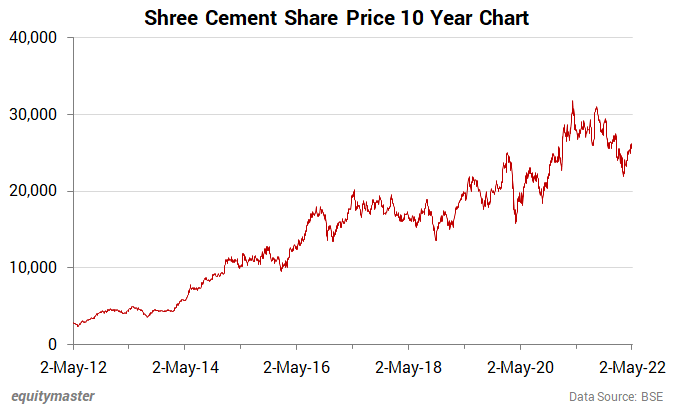
Market experts say the company will outperform its peers in the medium term and generate a healthy return of healthy return on invested capital (RoIC) of over 20% as it ramps up capacity and operations.
Just like Page Industries and Honeywell Automation, Shree Cement has never explored the option of a stock split since it was established 45 years ago.
Given its history of robust financial performance even under the most trying economic conditions, it is unlikely the company will consider a stock split in the short term.
To know more, check out Shree Cement's company fact sheet and quarterly results here.
#5 3M India
3M India is a pioneer in the diversified technology and science segment in India. It's a flagship listed company of 3M Co, USA that specialises in industrial equipment across diverse markets.
It commands a global presence and is a market leader across geographies for its medical devices, consumer goods, tamper evident labels, adhesives, automobile fillers, and coating businesses.
With high quality standards, the company's products cater to the needs of the industrial, transportation, electronics and communications, healthcare, display and graphics, consumer and office, safety, and security markets.
The company is home to popular brands including Scotch-Brite, Scotch, Nexcare, Command, Littmann, and Post-it. It currently has a market capitalisation of Rs 224.8 bn.
The company has 11.3 m outstanding shares. The stock is trading at a price of Rs 20,250 as of 29 April 2022.
Way back in March 2013, the shares were trading at Rs 3,300. This means the stock clocked an 613.6% gain in the last decade.
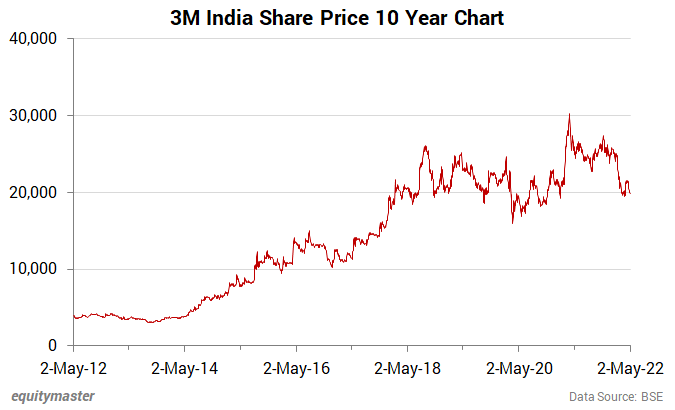
With a solid 75% promotor holding, the company is expected to accelerate investments in growth, productivity and sustainability.
This will position 3M for a strong performance. Most importantly, the company carries no debt and has a healthy liquidity position.
So far 3M India has not had a stock split during its many years of operating in India. With the positive indications of robust growth and performance, it appears to be an unlikely possibility anytime soon.
To know more, check out 3M India's company fact sheet and its latest quarterly results here.
Why Do These Highly Priced Stocks Stay Away from Stock Splits?
Other than MRF which went for two rounds of stock splits in the 70s, none of the other names in the top 5 Indian companies with the highest share price has opted to go down this road.
The story resonates with Warren Buffett's philosophy of 'no stock splits'.
There could be several reasons why Warren Buffett's Berkshire Hathaway and Indian conglomerates like Honeywell Automation, Shree Cement and the like have decided against a stock split.
The first reason could be to stay away from market volatility as much as possible. And avoid idle speculators.
The second reason could be to prevent any hostile takeovers. When the shareholding is controlled by a limited few with the majority of them being promoters of the company, this scenario can be successfully averted.
The third reason could be that when a stock split does happen, it will impact the earnings per share (EPS) of the company as the profit is divided by the increased number of shares.
The last reason could be more emotional.
Whether you agree with it or not, there is a certain amount of prestige and status that comes from holding a stock that is priced at over Rs 5,000 per share. When you dilute it through a stock split, you let in a class of investors much inferior to the original shareholder group.
This, in turn, may dilute the overall brand value of the company which many of these behemoths would like to avoid at any cost.
That's not to say there aren't any benefits that come with stock splits. There is a temporary spike in demand which can work in favour of the company.
For long term investors, a stock split will not make a difference as the overall value remains the same. If the company's fundamentals are strong, holding on to the stock to gain in the long run makes sense.
For the newbies, it's a way of getting off the sidelines and playing with the big boys of the market.
Which one are you?
Happy Investing!
Disclaimer: This article is for information purposes only. It is not a stock recommendation and should not be treated as such. Learn more about our recommendation services here...


Equitymaster requests your view! Post a comment on "5 Indian Companies with the Highest Share Price. Are they Likely to Split?". Click here!
Comments are moderated by Equitymaster, in accordance with the Terms of Use, and may not appear
on this article until they have been reviewed and deemed appropriate for posting.
In the meantime, you may want to share this article with your friends!